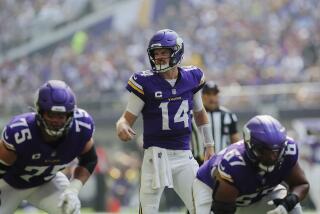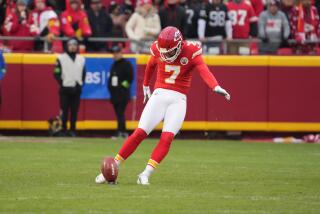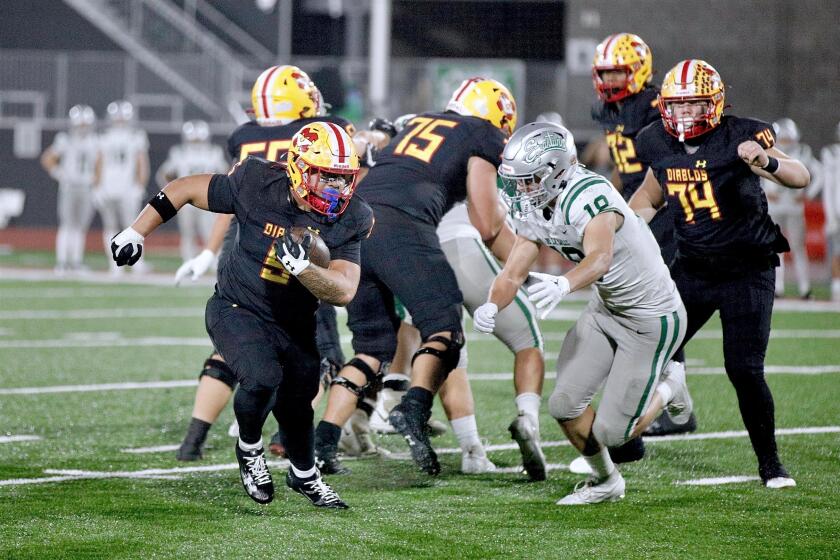Pro Football / Bob Oates : Quarterbacks Pass Into Instant Maturity
In Chicago, the legend of Doug Flutie has begun. Here, the legend of Jim Everett is well under way. And, elsewhere today, many other young quarterbacks are playing like veterans.
Doesn’t it take five years to make a National Football League quarterback? How can these people do it in five minutes?
Here are some possible explanations:
--Modern quarterbacks don’t have to call the plays. All they have to do is execute.
--Most have been operating in pro-style offenses since they were 14.
--Young quarterbacks who have the talent are being intensively trained and cultivated today in many American high schools and colleges in which coaches are often as knowledgeable as pro coaches.
--Television has had a lot to do with it. From the age of 9 or 10, a boy with an interest in football can see, and learn from, the great passers every week.
--Most pro teams have gone back to more man-to-man defenses, which are easier than zone defenses for an inexperienced passer to beat. The premium is more on throwing straight than reading.
The upshot is that Everett, among others, can be an instant quarterback. Maybe Flutie can, too.
When Hall of Famers like John Unitas and Joe Namath were playing football, the mark of a great quarterback was his ability to come up with the right play regularly.
“Play-calling is 60% of the job,” Unitas often said in his prime.
Namath won historic Super Bowl III not so much with his arm as his head.
In that era, indeed, play-calling--that is, running the team--was what it meant to be a quarterback. An undistinguished passer such as Bobby Layne, the late Hall of Famer, could play if he could run a football team.
Today, quarterbacking means passing. Almost anyone can do it if he has the hands and arm for the job.
It is sideline play-calling--the coach-called game--that has opened the gates to the flood of great modern quarterbacks--that is to say, the great passers.
Accordingly, the man who did the most to change the nature of quarterbacking can be identified as Hall of Famer Paul Brown, the inventor of coach-called plays.
Add Flutie: Perhaps the most difficult pass to make is the hard, twisting, downfield throw coming off a hard rollout to the left.
To pass accurately while rolling to one’s right is difficult enough. Only Joe Montana has passed well consistently while rolling to his left--and since his back surgery, even Montana doesn’t do that.
Flutie does. His long pass to Walter Payton for a touchdown Sunday was such a play. During a top-speed sprint to his left, Flutie saw Payton down around the goal line and, turning, unloaded the pass.
There are some indications that Flutie has landed in one of the few places where his unusual talent is appreciated and can be exploited.
His new coach, Mike Ditka, likes the wild side of football, the type preferred by Bear quarterbacks Jim McMahon and Flutie. Judging by Flutie’s first NFL game, Ditka will encourage him to wander around outside the pocket. At 5 feet 9 inches, the former Heisman Trophy winner is only effective out there. The USFL misused him as a pocket passer.
Ditka and McMahon, who is gone for the season, are compatible in their approach to football, but incompatible personally. The difference between Flutie and McMahon is that Flutie will make it his business to get along with Ditka.
In the quarterback controversies to come in Chicago, this is likely to be a decisive factor.
Before the Raider game at the Kingdome Monday night, talking about Seattle Coach Chuck Knox, a visiting scout said of the Seahawks: “This is no more than an 8-8 team. They haven’t much depth. If they finish better than 8-8, it will be the coaching.”
After Monday’s upset, Seattle is 8-6 with two weeks left. And the instructive thing about the game was how easily Knox won when his quarterback was on.
The way Dave Krieg has pitched the last two games for Seattle is a reminder that Knox could have prospered impressively if he’d had that kind of passing throughout his 14-year NFL career.
Only the other day, one of Knox’s winners, Pat Haden, was saying: “Chuck’s only problem is that he has never had a great quarterback.”
He has everything else. Asked what it takes to last 14 years in pro ball, Knox said: “The X’s and O’s are a small part of it. The key is maintaining the right overall perspective--relating to the players, the assistant coaches, the owners and the press, and relating to the stress that comes with the job.”
After 14 weeks of instant-replay officiating, what has the NFL learned? Should it rely on commercial television again next year?
Knox votes yes.
“I think it’s important for us to stick with it,” he said. “The thing we have to do is a better job of training the (replay officials).
“When you leave a football game up to the officials on the field, you give them a chance to decide the game with a glaringly wrong call.
“That’s unfair to the players, and we have to do something about it if we can. Replay pictures seem to be the only possible way.”
It has been some time since the Cincinnati Bengals or Cleveland Browns have figured in one of the NFL’s biggest events of the year. But the Bengal-Brown game at Cincinnati Sunday will be all of that.
“We’re one game up on (the Bengals), but as a football fan, I sure like their players,” said Cleveland quarterback Bernie Kosar, noting that when this one is over, both clubs could have scintillating records.
If they win, the Browns will be 11-4. If the Bengals win, each team will be 10-5--a rare record for AFC Central teams.
The Bengals, as Kosar suggested, may have an edge in overall personnel. Their fullback, Stanley Wilson, gained 120 yards last week when halfback James Brooks gained 163.
The quarterback matchup will be Kosar vs. Boomer Esiason. With so much on the line, the Central title game may be worth watching for just that.
More to Read
Go beyond the scoreboard
Get the latest on L.A.'s teams in the daily Sports Report newsletter.
You may occasionally receive promotional content from the Los Angeles Times.










